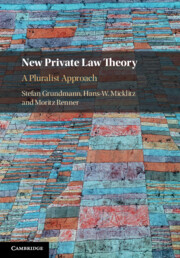Book contents
- New Private Law Theory
- New Private Law Theory
- Copyright page
- Contents
- Preface
- New Private Law Theory
- Part I Methods and Disciplines
- 1 The Inside and the Outside of Law?
- 2 Private Law and Sociology
- 3 Economics and Private Law Institutions
- 4 Private Law and Theories of Communication
- 5 Comparative Law and Legal History
- Part II Social Ordering, Constitutionalism and Private Law
- Part III Transactions and Risk: Private Law and the Market
- Part IV Persons and Organizations
- Part V Private Law (Rule-Setting) beyond the State
- Index
- References
5 - Comparative Law and Legal History
from Part I - Methods and Disciplines
Published online by Cambridge University Press: 09 April 2021
- New Private Law Theory
- New Private Law Theory
- Copyright page
- Contents
- Preface
- New Private Law Theory
- Part I Methods and Disciplines
- 1 The Inside and the Outside of Law?
- 2 Private Law and Sociology
- 3 Economics and Private Law Institutions
- 4 Private Law and Theories of Communication
- 5 Comparative Law and Legal History
- Part II Social Ordering, Constitutionalism and Private Law
- Part III Transactions and Risk: Private Law and the Market
- Part IV Persons and Organizations
- Part V Private Law (Rule-Setting) beyond the State
- Index
- References
Summary
European integration is now seventy years old and is about to turn into a historical research project of its own. It rests on the premise that the nation states share a common heritage, as well as intellectual, economic, political and philosophical foundations which hold the European legal system together. Law and integration through law are the means to realize the ambitious project (Chapter 24). The European Court of Justice (ECJ) is regarded as the motor of integration. The European Single Act advocated the building of an internal market, no longer through the four market freedoms and competition law alone, but most prominently through secondary EU law.
- Type
- Chapter
- Information
- New Private Law TheoryA Pluralist Approach, pp. 110 - 128Publisher: Cambridge University PressPrint publication year: 2021



